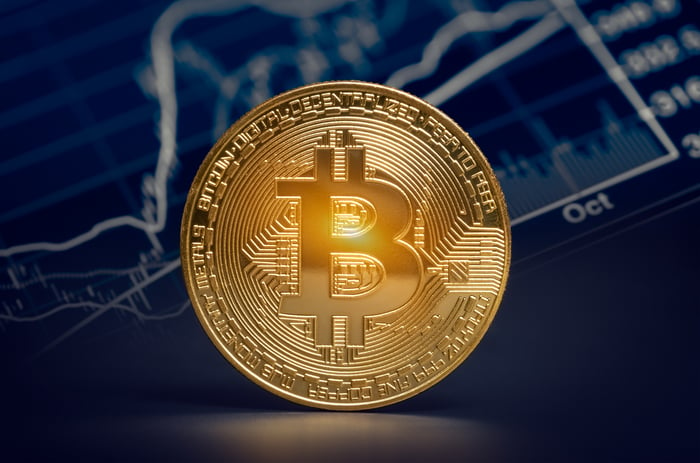Looking back on Bitcoin's (BTC -1.83%) 15-year history, there are several events that we can confidently agree had a significant effect on its trajectory. Developments like the creation of the first Bitcoin exchange like Mt. Gox streamlined transactions for early Bitcoin pioneers, while the recent approval of spot Bitcoin exchange-traded funds (ETFs) has given the cryptocurrency a new home on Wall Street.
Rest assured that there are plenty of other transformative events that have yet to occur. Here are three developments that could happen this year that hold the potential to add to Bitcoin's historic journey of price appreciation.

Image source: Getty Images.
A halving unlike any before takes shape
In mid-April, Bitcoin is scheduled to undergo its fourth halving. Halving is a process hardwired into Bitcoin's code that cuts its supply growth rate in half roughly every four years. Today, its growth rate hovers around 1.75%, but after the next halving passes, it will fall below 1% to roughly 0.8%.
Historically, the halving has been a major catalyst for price appreciation. A cut to the growth of supply makes it so that even if demand stays constant, prices must increase to adjust for the diminished number of new Bitcoin. On average, Bitcoin's price increases around 125% in the year a halving occurs.
While past performance is no guarantee of future results, this halving is shaping up to be unlike any before. That's because for the first time ever, Bitcoin has a new buyer in the form of Wall Street's biggest names.
With the approval of Bitcoin ETFs, firms such as BlackRock and Fidelity have begun to accumulate bitcoins at a historic rate. Collectively, these new ETF sponsors already hold around 4% of Bitcoin's total supply.
Unlike past halvings when Bitcoin's primary buyers were retail investors, the institutions now buying Bitcoin have significantly deeper pockets and more capital at their disposal. Should their rate of accumulation continue, this halving could be particularly explosive, especially considering that the number of bitcoins available for purchase on exchanges is at its lowest level since 2018. With an existing supply crunch, the halving will increase pressure on Bitcoin and could potentially fuel a price jump of historic proportion.
Embracing the Bitcoin standard
During the last crypto bull market, we saw a handful of companies announce Bitcoin purchases. One of those was MicroStrategy (MSTR 3.38%), a business software company that has rebranded to a Bitcoin development company.
Since 2020, MicroStrategy and its former Chief Executive Officer Michael Saylor have accumulated more than 205,000 bitcoins, nearly 1% of all the Bitcoin that will ever be created. Citing a weak dollar and the characteristics that make Bitcoin a superior asset, Saylor is paving the way for what he calls the "Bitcoin standard."
While this was laughed at and written off when Bitcoin's price tumbled in the crypto winter, Saylor remained steadfast in his conviction and accumulation. Today, MicroStrategy is currently sitting on an unrealized gain of $7.8 billion, and its stock price is up more than 700% in the past year.
Saylor's embrace of the Bitcoin standard is proving to the world that replacing cash with Bitcoin is an effective strategy to bolster financial strength. With a proven blueprint, it is almost a guarantee that other companies are starting to take notice of how viable the Bitcoin standard is.
In the coming bull market, don't be surprised if some more prominent companies -- perhaps the likes of Amazon, Google, or Mastercard -- announce that they too will pursue the Bitcoin standard. If one of these household names deems Bitcoin a staple of balance sheets, it would dramatically alter the cryptocurrency's trajectory for the better.
The ultimate achievement remains a possibility
As if the last bull market cycle wasn't busy enough with companies deciding to buy Bitcoin, we've also witnessed a country deciding to make Bitcoin legal tender. In June 2021, the Central American country of El Salvador announced it would make Bitcoin an official currency. Since the announcement, the country has added nearly 3,000 bitcoins to its treasury.
As part of its Bitcoin-centric plan, President Nayib Bukele has initiated a bond program that leverages the cryptocurrency, waived all taxes on Bitcoin, and even started mining operations powered by one of the country's many volcanoes.
Given El Salvador's minor role on the global stage, the decision largely escaped notice. Yet, with three years of data since elevating Bitcoin to legal tender, the results are proving advantageous for the small country.
Although international organizations warned that the decision to embrace Bitcoin would introduce economic risks, El Salvador's economy has reached an annual growth rate of 2%, and its Bitcoin holdings are sitting on an unrealized gain of nearly 70%.
Now, don't get me wrong. Bitcoin isn't the sole reason for El Salvador's economic improvements. But the success that it has had since declaring Bitcoin legal tender and the innovative strategies to build around the cryptocurrency are difficult to dismiss. In a similar vein to Saylor, El Salvador is proving that there is a different way for countries on the global economic periphery to do things.
However, imagine if a country like Russia or Venezuela decides to pursue Bitcoin in an effort to circumnavigate economic sanctions. Or what about a rapidly developing country looking to solidify its role on the global stage, like Brazil or Qatar?
If institutional adoption has the potential to transform Bitcoin's trajectory, then countries beginning to allocate could send it to unimaginable heights. As this crypto bull market forges ahead, it wouldn't be shocking to see another country embrace the Bitcoin standard and follow in El Salvador's footsteps.





